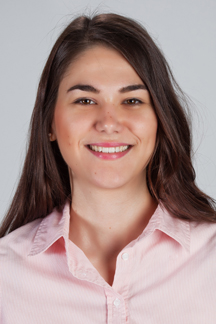Graduate Student Sany Hoxha: Captivated by Complexity
By Jeremy Pyle
For Sany Hoxha, a graduate student on the Florida campus of The Scripps Research Institute, science is more than just a source of great personal satisfaction. It’s a way of looking at the world—empirically and with a sense of curiosity.
“My passion for biology started very early as I learned more about cellular concepts,” she said. “I was amazed at how our bodies simultaneously regulate numerous pathways. What mechanisms could possibly drive our organs and make each of our trillions of cells harmoniously interact with perfect synchronicity? The complexity of the human body is what captivates my attention and drives me to seek better answers.”
As an undergraduate studying biology at Florida Atlantic University’s Harriet L. Wilkes Honors College, Hoxha developed a strong theoretical background and general understanding of the physiology of cells and complex organisms. It was through hands-on laboratory experience on the neighboring Florida campus of The Scripps Research Institute (TSRI) that her skills and interest were taken to the next level.
An Inspirational Summer
Hoxha applied for and was accepted to TSRI’s SURF (Summer Undergraduate Research Fellows) Program, which offers college undergraduates the opportunity to spend 10 weeks immersed in biomedical research on either TSRI campus. She joined Assistant Professor Bill Ja’s laboratory in Scripps Florida’s Department of Metabolism and Aging. It was a summer that had a profound impact on her perspective.
“The experience with Dr. Ja inspired me to pursue a research career,” said Hoxha. “I received excellent mentorship and realized that we were here to ask exciting questions, to be leaders in our field and to actively contribute to the scientific community.”
Now starting her second year as a TSRI graduate student on the institute’s Florida campus, Hoxha’s search for answers is driven by her daily research activities in the Cancer Biology laboratory of Associate Professor Joseph Kissil. In this capacity, she is working toward an understanding of the basic biological mechanism of cancer sensitivity and resistance.
“As a member of the Kissil lab, I have the opportunity to study the mechanism by which PAK1, a protein kinase that is commonly overexpressed in a multitude of cancer types and interacts with transcription factors, contributes to tumorigenesis and cell growth. Our goal is to elucidate key components of the PAK molecular pathway and develop a small molecular PAK1 inhibitor.”
Charting a Path in Cancer Biology
Looking to the future, Hoxha says she intends to establish herself as an independent investigator working in basic cancer biology.
“My research interests involve developing more effective therapeutic strategies and understanding the basic biological mechanism of cancer sensitivity and resistance. Ultimately, I envision myself joining a clinical research team at a medical school to engage in translational cancer research.”
In the meantime, Hoxha plans on taking advantage of the various career tools and resources TSRI offers to its graduate students.
“Scripps really builds the foundation for our predoctoral training,” said Hoxha. “For example, this year I took advantage of numerous professional development workshops and seminars offered by the Career and Postdoctoral Services Office. From writing fellowships to effectively communicating or even creating our individual development plans, Career Services is the perfect resource to help us achieve our short- and long-term goals.”
The close-knit, cross-disciplinary academic environment on the Florida campus has proven particularly helpful to Hoxha.
“I can’t emphasize enough how this campus allows for strong collaborations and an ease of interaction that ultimately contributes to excellent science,” she said. “Faculty, postdoctoral fellows and graduate students are all happy to offer help, whether it’s to review our manuscripts or assist in fellowship writing. A graduate student can improve her or his skills, do excellent research, and ultimately prosper in this exciting scientific environment.”
This article appears in the inaugural issue of Scripps Education Reporter, which focuses on news from TSRI’s top-10 ranked graduate program and other training programs. To learn more about the publication, see http://education.scripps.edu/about/enewsletter/index.html
Send comments to: press[at]scripps.edu














